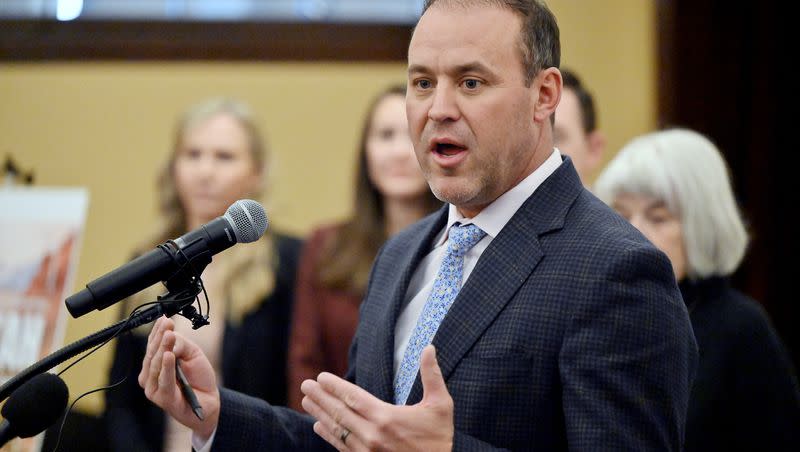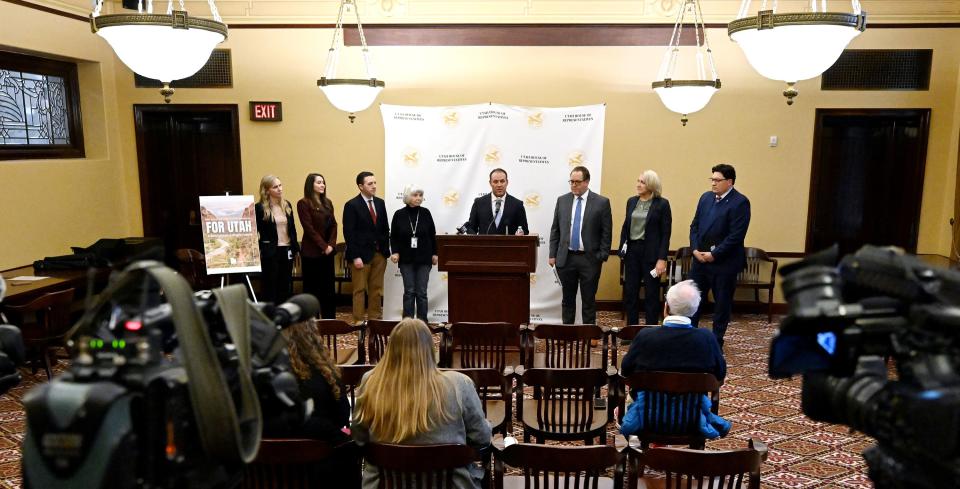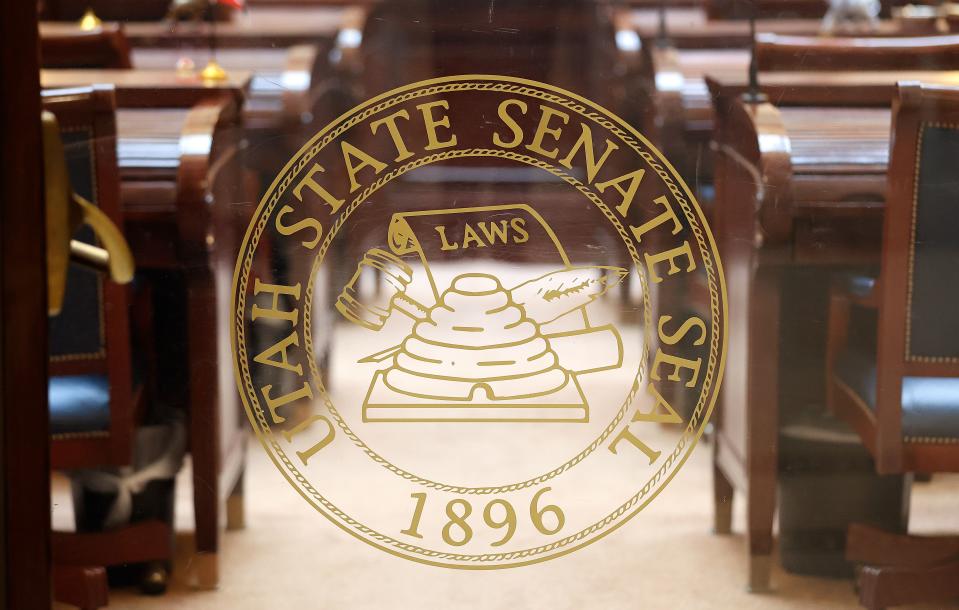Here’s what the Utah Legislature’s Republican majority wants to do during the 2024 session

- Oops!Something went wrong.Please try again later.
- Oops!Something went wrong.Please try again later.
When Utah lawmakers meet Tuesday to kick off their annual 45-day session, the focus will be on the lists of priorities set by the Republican supermajorities in the House and the Senate.
The House majority published a 45-page guide entitled, “For Utah A Bold Vision, A Bright Future,” to showcase their intention to “pass policies that address today’s problems and create generational benefits” for Utahns.
The Senate majority caucus put together a priority list, too, “Utahns First Sustainability At Every Level,” that promises the state can prepare for any challenges by “building on the achievements of the past and prioritizing family and business-friendly policies.”
The issues to be tackled are largely general and don’t delve into some of the hot-button topics coming up, such as efforts to curtail diversity, equity and inclusion practices at the state’s public universities and colleges, or attempts to limit voting by mail.
Related
Banning phones in class? Cheaper homes? Here are 5 key things to watch in Utah’s legislative session
Utah’s Democratic lawmakers in the House and Senate aren’t planning to release their priorities until the start of the session, a spokeswoman said. Democrats hold just 14 of the 75 House seats and six of the 29 Senate seats.
New House Speaker Mike Schultz, R-Hooper, went over his chamber’s priorities on Monday with the Deseret News editorial board and rolled them out at a news conference in the state Capitol on Wednesday,
“It’s been more robust, with more involvement, than any other one that we’ve done before,” Schultz told reporters Wednesday, saying the list of priorities “really, truly is our caucus as a whole coming together.”
They go beyond “what’s popular at the moment” to address long-term needs, the speaker said. “We’re at a pivotal time in the state’s history. As we transition form a small state to a medium state, the decisions we make today will have generational impact.”

Utah House Republican priorities
The House GOP divided its priorities into four areas:
People: “We want to make sure we continue to create policy that makes us a family-friendly state going forward,” House Majority Leader Jefferson Moss, R-Saratoga Springs, said at the news conference, including by reducing regulations that limit access to child care and promoting what’s known as the “success sequence” of life events for young adults.
Taxpayers, Moss said, are “feeling the sting of inflation.” The House majority is promising to “continue to improve government efficiency so we can ease tax burdens.” Legislative leaders have already set aside $160 million for what will likely be another income tax cut this year, but Schultz said it’s “irresponsible” to say that’s the right number until after new state revenue projections come out in February.
Limiting regulation is also the GOP representatives’ plan for improving the health and well-being of Utahns, Moss said, and working with local governments to address homelessness is also on the agenda.
Improving school safety, easing the burden of school fees and “making it a more desirable thing to be a teacher, looking for ways to create more innovative pathways into the teaching profession” are ways to helps students and teachers, Moss said.
Resources: For water, Moss said lawmakers will be trying “to find ways to conserve it and coordinating efforts across the state” to deal with drought. Energy is a big topic on the hill this year, with a statewide plan in the works to ensure “reliable, affordable and dispatchable” sources in the wake of what the majority caucus calls “Washington, D.C.’s irrational energy policy.”
The nation’s capital is also a target in the lands policy. “Lands is very important. We want to continue to fight for our lands, to be able to have access to our lands,” Moss said, referring to the federal government’s ownership of about two-thirds of the state’s acreage. The House Republicans are also calling for recognizing that “technological development and innovation in fossil fuels are part of the solution to our environmental challenges.”
Related
Accountable government: “We believe the federal government continues to overreach and we want to continue to push back on that overreach, fighting for our state rights,” Moss said. “Internally, we want to make sure the government is more efficient, finding ways to cut waste.” Schultz told the Deseret News that the Legislature’s budget committees have not been given a specific goal for reducing spending.
Public safety is part of the focus on accountability. Moss said there are a number of efforts underway to answer the question, “how do we make sure that our citizens feel safe.” Those include dealing with staffing shortages as well as “other challenges” threatening the safety and security of state prison staff and inmates.
Higher education falls into this category, too, on the House GOP list. Moss said people should feel like they’re free to express their opinions on college campuses, and “not have to worry about whether you’re going to be scrutinized on that. We want to make it inclusive for everyone.” Also on the agenda is reducing the time and money needed to earn a degree.
Future: “We’re looking for innovative solutions to big problems,” Moss said, in housing, transportation and technology. Reducing regulation is again part of the plan to “streamline” the development of an increased supply of affordable housing.
Transportation investments “are essential to maintain Utah’s high quality of life,” the caucus’ guide says, accounting “for growth where it is happening” while considering all options including public transit.
Moss said House Republicans “want to look at new ways to embrace new technology but also make sure we’re safeguarding our data.” The guide points out that artificial intelligence “promises to boost productivity and enhance our everyday lives; however, potential risks like misinformation and deep fakes pose a threat to public wellbeing.”

Utah Senate Republican priorities
Senate President Stuart Adams, R-Layton, who is serving his sixth session as a top legislative leader, stressed the need to continue the state’s significant successes.
“We’ve got kind of a legacy that we need to uphold. When I think about what’s been done before us, we’re very fortunate,” Adams said, citing Utah being singled out nationally for the state’s economic and other strengths, including volunteerism.
“There’s been some great things happening in Utah,” he said. “But with those great things, there are some challenges also.” The Senate majority caucus has identified those that will be a priority this session. They are:
Energy: “Energy drives our economy,” Adams said. “We’re going to do everything we can to try to keep our energy prices reasonable in Utah even though a lot of it is out of our control. We’ll do what we can here.”
The state will still move toward renewable energy “but we’re not going to do it at the expense of our economy, he said, adding that means finding ways to keep coal-fired power plants open longer, although it’s “very unlikely” there will be financial incentives offered.
Water: “Water has already been a priority in a drought,” Adams said, “We’ll continue to look at innovative conservation practices and trying to find a way to protect the Great Salt Lake and develop the water resources we need.”
Education: Among contiguous states, “we have the highest starting teacher salaries after what we did last year and we’ve doubled the spending on education in the last 10 years,” he said, but a bill is in the works to raise the pay to $100,000 for “high performing teachers.”
Affordable housing: “Great efforts” have been made in the past on higher-density developments in cities but Adams said he’s “been panicked we’re losing our middle class. Home ownership is really the American dream.”
Last session, the Senate leader sponsored legislation setting up a fund for first-time homebuyers that he said sparked the governor’s budget proposals on housing. Adams stopped short of signing off on that plan, but pledged to “continue to focus on trying to get people into a home.”
Homelessness and criminal justice reform: While the issues are listed separately on the Senate majority’s list, Adams said they should be combined. “We need to make sure we’re giving people a hand up, not a hand out, that we’re trying to motivate them to change their circumstances.”
He said there will probably be some “refinements” of the governor’s homelessness proposals but “we’re aligned for sure in principle.”
Related
Infrastructure: The economy may dictate what lawmakers can do, Adams said, when it comes to improving Utah’s transportation system and addressing traffic congestion to keep up with the continued growth in our state.
Fiscally responsible tax cut: “We’ve cut taxes again and again and again, three years in a row but again this year we’ll be probably a little more cautious,” Adams said, due to the slowdown in the state’s revenue growth that he blames on energy prices. Like Schultz, he suggested there may be changes to the proposed $160 million tax cut.
Social media: Utah “will continue to lead in that. We’ll stand up and protect our kids against any litigation,” Adams said. “It’s pretty much documented that we’re seeing some difficult social effects from social media,” especially on teenaged girls.

